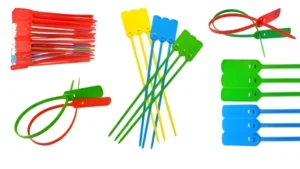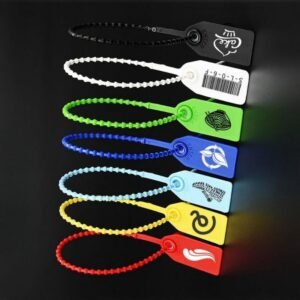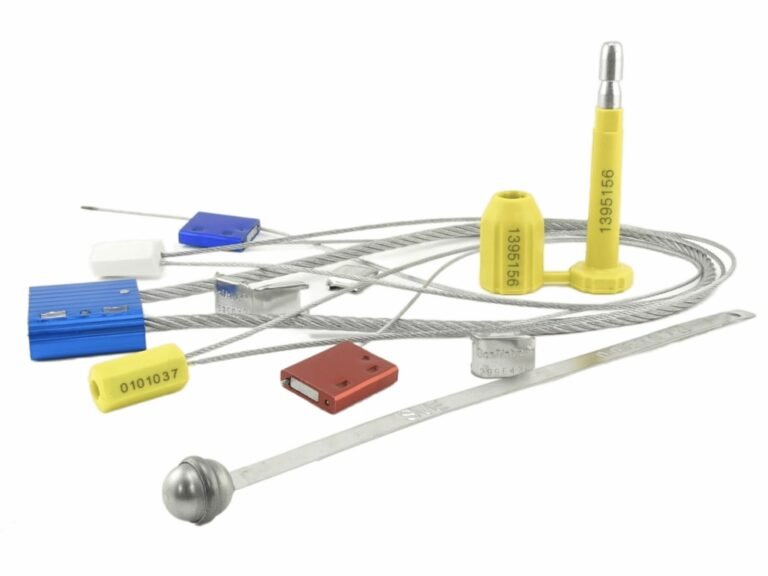
Plastic seals are tamper-evident security devices designed to protect goods, documents, and equipment from unauthorized access. Made from durable yet lightweight materials like polypropylene or nylon, these seals provide a cost-effective way to ensure integrity and safety across various industries. In addition to security, plastic seals offer:
- Convenience – Easy to apply and remove while ensuring protection.
- Versatility – Available in various types to suit different applications.
- Traceability – Some models include serial numbers or barcodes for tracking.
- Cost-Effectiveness – Affordable compared to other security sealing methods.
- Customization – Can be branded or color-coded for identification.
Types of Plastic Seals
It is usually divided into three types
- Fixed-Length Seals: Designed for easy manual removal, ideal for frequent access.
- Pull-Tight Seals: Pre-set locking position, non-adjustable, requires cutting for removal.
- Breakaway Seals: Designed for manual removal without tools, ensuring fast and convenient access
Different Varieties of Plastic Seals and Their Applications
| Seal Type | Category | Features | Common Applications |
|---|---|---|---|
| Padlock Seals | Fixed-Length Seals | Resembles a padlock; often includes serial numbers | Airline trolleys, lockers, food delivery packaging |
| Ball Lock Seals | Fixed-Length Seals | Uses a ball mechanism for locking; cannot be reopened | Container shipping, logistics security |
| Plastic Snap Seals | Fixed-Length Seals | Closes with a snap-fit mechanism; irreversible once broken | Banking cash bags, food packaging |
| Plastic Strap Seals | Pull-Tight Seals | Resembles a zip tie; adjustable for different sealing needs | Logistics, warehousing, retail industry |
| Twist Seals | Pull-Tight Seals | Requires twisting to lock; irreversible once broken | Utility meters, gas meters, tamper-evident applications |
| Security Label Seals | Pull-Tight Seals | Adhesive label that leaves a "VOID" mark when removed | Electronics, medical supplies |
| Ballot Box Seals | Fixed-Length Seals / Breakaway Seals | Designed for securing ballot boxes; easy to break by hand | Elections, confidential document protection |
| Pull-Ring Seals | Breakaway Seals | Features a small ring that can be pulled to break the seal easily | Postal bags, emergency kits, |
how to Choose the Right Plastic Seal?
Selecting the right plastic seal depends on several factors, including security requirements, application type, and ease of removal. Here’s a guide to help you make the best choice:
Determine the Security Level Required
- High Security: Choose Fixed-Length Seals (e.g., padlock seals, ball lock seals) that require cutting for removal.
- Moderate Security: Choose Pull-Tight Seals, which offer adjustable tightness.
- Low Security & Quick Access: Choose Breakaway Seals, which can be removed by hand.
Consider the Application Environment
- Logistics & Transportation: Fixed-length or pull-tight seals for securing cargo and containers.
- Retail & Banking: Pull-tight seals for securing cash bags, deposit boxes, and retail packaging.
- Healthcare & Pharmaceuticals: Security label seals or clip seals for medical packaging.
- Government & Elections: Breakaway seals for ballot boxes and confidential documents.
Check the Removal Method
- Requires Cutting: Fixed-length and pull-tight seals.
- Hand Removable: Breakaway seals.
Look for Additional Features
- Numbering & Barcodes: For tracking and tamper evidence.
- Material Strength: Polypropylene for general use, nylon for extra durability.
- Color Coding: For identification and security levels.
How Plastic Seals Work?

Plastic seals function as tamper-evident security devices that lock onto containers, bags, or equipment to prevent unauthorized access. Their effectiveness lies in their one-time use design, ensuring that any tampering attempt is immediately visible.
Locking Mechanism
- The seal is inserted into the locking chamber, where it secures in place.
- Depending on the type, it may lock at a fixed length (Fixed-Length Seals) or tighten as needed (Pull-Tight Seals).
Tamper Evidence
- Once locked, the seal cannot be removed without breaking or cutting.
- Visible damage (e.g., broken parts, stretched plastic, or missing numbers) indicates tampering.
Identification & Tracking
- Many plastic seals have unique serial numbers, barcodes, or company logos to ensure authenticity.
- Some seals use color coding for different security levels or departments.
Removal Process
- Fixed-Length & Pull-Tight Seals: Require scissors or cutters.
- Breakaway Seals: Can be broken by hand for quick access.
What are the benefits of using plastic seals over other types of seals?

Plastic seals offer several benefits over traditional seal types like bolt, padlock, cable, meter, and metal seals. They are cost-effective, lightweight, and easy to apply, making them ideal for large-scale production. Unlike metal and cable seals, which require special tools for application and removal, plastic seals can be easily applied and removed without additional equipment, improving efficiency. They can also be customized with logos and serial numbers for better branding and tracking, while maintaining tamper-evident features to ensure security.
Additionally, plastic seals are more environmentally friendly, with recyclable and biodegradable options available, unlike metal and cable seals that are typically not recyclable. They are also durable, resistant to moisture and UV rays, and less prone to corrosion compared to metal seals. With their affordable pricing, ease of use, and environmental benefits, plastic seals remain a popular choice in various industries, providing a secure and efficient solution for packaging and logistics.
What are the advantages of Plastic Seals?
Plastic seals offer a cost-effective and tamper-evident solution for securing goods, equipment, and sensitive items. Their versatility makes them widely used across industries such as logistics, healthcare, retail, and banking. Below are the key benefits of plastic seals:
Tamper Evidence
- Designed for one-time use, making any tampering attempt immediately visible.
- Prevents unauthorized access and enhances security.
Cost-Effective
- More affordable than metal security seals.
- Suitable for high-volume applications without significantly increasing costs.
Lightweight & Durable
- Made from polypropylene (PP) or nylon, offering durability while remaining lightweight.
- Resistant to moisture, chemicals, and temperature changes in harsh environments.
Versatile & Easy to Use
- Available in Fixed-Length, Pull-Tight, and Breakaway designs for different security needs.
- Simple to apply without requiring special tools for installation.
Customization & Tracking
- Can be printed with serial numbers, barcodes, company logos, or color codes for better tracking and identification.
- Helps with supply chain management and fraud prevention.
Eco-Friendly Options Available
- Some manufacturers offer biodegradable or recyclable plastic seals to reduce environmental impact.
FAQs About Plastic Seals
Are plastic seals customizable?
Yes, plastic seals can be customized with logos, colors, text, or serial numbers, making them ideal for branding and increasing security.
Are plastic seals environmentally friendly?
Some plastic seals are made from recyclable materials, and there are biodegradable options available. However, traditional plastic seals may contribute to plastic waste if not disposed of properly.
How do you remove plastic seals?
Plastic seals are typically removed by breaking or cutting them. For tamper-evident seals, once removed, they cannot be reused or resealed, making it clear if tampering has occurred.
Where are plastic seals commonly used?
Plastic seals are widely used in industries such as logistics, transportation, retail, food and beverage, pharmaceuticals, and security to ensure product integrity and prevent tampering.
Can plastic seals be reused?
Plastic seals are designed for one-time use only. Once they are removed or tampered with, they cannot be reused.
Conclusion
Plastic seals are cost-effective, reliable, and tamper-evident security tools widely used across industries such as logistics, healthcare, and retail. They offer ease of use, customization, and traceability, ensuring product safety and integrity. While traditional plastic seals may have an environmental impact, recyclable or biodegradable options are reducing this burden. Overall, plastic seals remain an essential choice in many industries due to their efficiency and security features.

